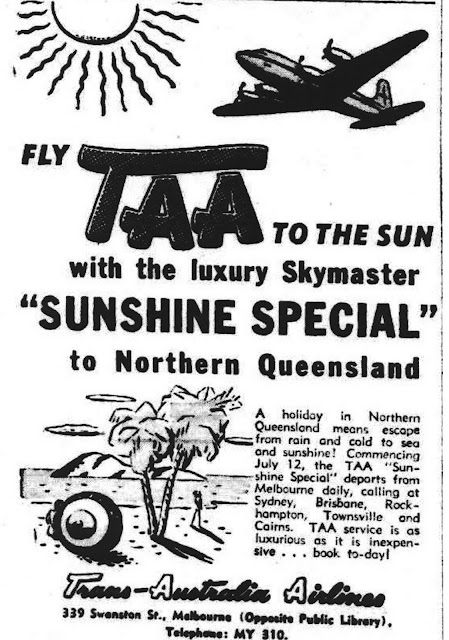In May 1952, a record
was set when the Trans Australia Airlines (TAA) DC-4 Skymaster John Eyre took off from Townsville with
all of its 50 seats occupied. Though it was the biggest airlift of passengers
in north Queensland at the time, it barely rated a mention in the local press.
 |
|
Passengers board TAA’s first DC-4 Skymaster, the John Eyre, at Garbutt
Airport, Townsville, 1952.
Photo: CityLibraries Townsville Local History Collection.
|
In the post-war years
there were only two major domestic airlines in Australia. Australian National
Airways (ANA) was a privately owned airline run by a shipping conglomerate, and
had been operating since 1936. TAA was set up in 1946 by the Australian
government and began its operations in Melbourne.
The first of four DC-4
Skymasters ordered by TAA from the USA arrived in Australia in early October
1946 and undertook its maiden flight from Melbourne to Perth in November. This
aircraft was named the John Eyre, after
the explorer who pioneered the crossing of the continent from east to west.
TAA’s next three Skymasters
also bore the names of explorers and were christened Thomas Mitchell, John Forrest
and McDougall Stuart. TAA continued
to name its subsequent aircraft after Australian explorers, with one exception.
The Skymaster John Gould was named in
October 1951, after the Australian ornithologist of the same name. Gould is widely
known as the “father” of bird study in Australia thanks to his book The Birds of Australia, first published
in 1840.
 |
| TAA's DC-4 Skymaster, the McDougall Stuart at Townsville, 1950s. Photo: CityLibraries Townsville Local History Collection. |
In May 1952, TAA
commenced operating a Skymaster service to north Queensland. A passenger could
depart Brisbane at 2.20pm and after stopping at Rockhampton and Mackay, be in
Townsville just five hours later at 7.20pm. The service then continued on to
Cairns where it stopped overnight before returning to Townsville the following
morning at 8.30am.
The travelling public
welcomed the new service to north Queensland, as the larger aircraft could
accommodate more passengers than its predecessors. This was particularly
important during the tourist season, when an influx of visitors descended on
the north.
In the late 1940s TAA
advertising encouraged people to “Fly TAA to the sun with the luxury Skymaster
‘Sunshine Special’ to Northern Queensland,” with a promise that the TAA service
was “as luxurious at it is inexpensive”.
“A holiday in
Northern Queensland means escape from rain and cold to sea and sunshine!”
 |
| An advertisement for TAA's north Queensland flights from the Melbourne Argus in June 1947. Source: Trove |
When Ansett Airways entered
the north Queensland market in May 1954, a flight from Brisbane to Cairns on
TAA or ANA cost £18/19 shillings. Ansett undercut the big players by about ten
per cent, setting its fare at £17/1 shilling, in a bid to get a share of the
lucrative northern tourist market. Neither TAA or ANA felt particularly
threatened by Ansett at this time, as they felt that people would still prefer
to fly north on their larger, four-engined Skymasters, while Ansett was operating
with smaller DC-3s.
In 1960, TAA found
itself at the centre of Australia’s worst civil aviation disaster when one of
its aircraft, a Fokker Friendship, crashed into the sea off Mackay, killing all
29 passengers and crew on board. Mackay’s airport was fog-bound so the plane
circled for an hour and twenty minutes before it was cleared to land. At
10.30pm the Captain advised that he was beginning to make the approach to the
runway, but the plane failed to make the landing.
No comments:
Post a Comment